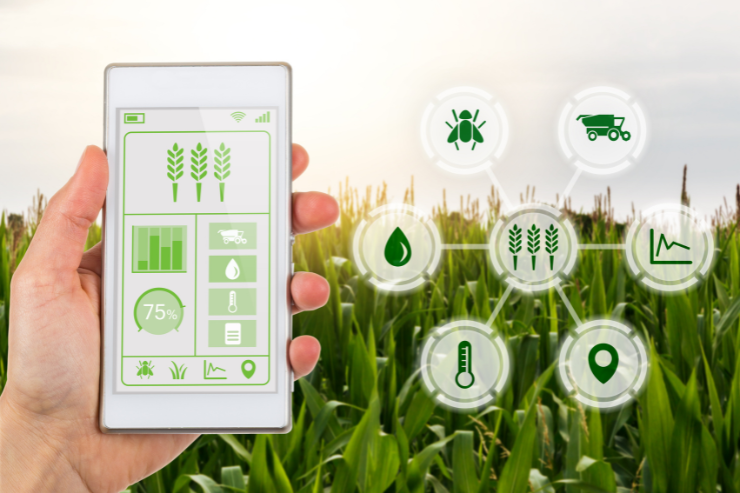With the continuous increase in the global population, there is a greater need for food, which puts substantial pressure on agriculture to become more effective and sustainable. Artificial Intelligence (AI) is essential in revolutionizing agriculture by optimizing farming methods, enhancing crop yields, and ensuring food security. Using advanced technologies and data insights, AI is changing how farmers manage agriculture and address the challenges of feeding the rising global population.
Trends in AI & Agriculture:
The future potential of AI in agriculture is promising, with progression in machine learning, robotics, and data analysis driving innovations. AI technologies are expected to become easier and more common in daily farming, making agricultural systems more innovative and more efficient. However, using these technologies widely brings challenges like data privacy, algorithm bias, and the need to retrain workers.
- Precision Farming: AI has significantly impacted agriculture by introducing precision farming techniques. AI-driven tools allow farmers to collect and analyze data from drones, sensors, and satellites, providing real-time insights into soil conditions, weather patterns, and crop health. Using this data, farmers can make smart choices about watering, pest control, and fertilizing, which boosts productivity and cuts down on waste.
For example, AI algorithms can assess satellite images to supervise crop health and pinpoint areas that require attention. Farmers can take corrective actions before major damage occurs by recognizing early signs of disease or nutrient deficiencies, ensuring higher yields, and reducing losses.
- Crop Monitoring and Disease Detection: AI plays a crucial role in observing crops and identifying diseases. Traditional ways of recognizing crop diseases can be time-consuming and laborious. AI-powered systems process large amounts of data to detect anomalies and forecast potential disease outbreaks.
Early disease detection helps farmers to take specific actions to stop diseases from spreading and reduce the need for chemicals. This approach keeps crops healthier and supports more sustainable farming.
- Robotics and Automation: Robotic systems equipped with AI are changing labor-intensive agricultural tasks. AI-powered robots can carry out these tasks accurately and efficiently, from planting and harvesting to weeding and pruning. These automated solutions diminish the need for manual labor and increase operational efficiency, allowing farmers to concentrate on strategic planning and decision-making.
Aside from fieldwork, AI-powered robots are also utilized in livestock management. Automated systems monitor animal health and behavior, offering valuable insights for farmers to optimize animal welfare and productivity.
- Sustainability and Resource Management: AI aids in optimizing resource usage in agriculture, ensuring sustainable practices that minimize environmental impact. AI systems analyze data to find the most effective ways to use pesticides, fertilizers, and water. This helps to reduce waste and manage resources better. This approach is expected to increase productivity and will contribute to environmental preservation.
Concluding Remarks!
AI transforms agriculture by facilitating precision farming, early disease detection, and efficient resource management. As technology progresses, AI will play a critical role in nourishing the future and ensuring food security and sustainability. By adopting AI innovations, the agricultural industry can tackle the challenges of producing edibles for a growing population and support sustainable practices for future generations.
Also Read:

